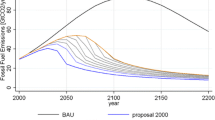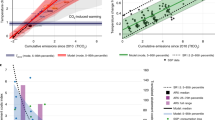Abstract
Most quantitative studies of climate-change policy attempt to predict the greenhouse-gas reduction plan that will have the optimum balance of long-term costs and benefits. We find that the large uncertainties associated with the climate-change problem can make the policy prescriptions of this traditional approach unreliable. In this study, we construct a large uncertainty space that includes the possibility of large and/or abrupt climate changes and/or of technology breakthroughs that radically reduce projected abatement costs. We use computational experiments on a linked system of climate and economic models to compare the performance of a simple adaptive strategy - one that can make midcourse corrections based on observations of the climate and economic systems - and two commonly advocated ‘best-estimate’ policies based on different expectations about the longterm consequences of climate change. We find that the ‘Do-a-Little’ and ‘Emissions-Stabilization’ best-estimate policies perform well in the respective regions of the uncertainty space where their estimates are valid, but can fail severely in those regions where their estimates are wrong. In contrast, the adaptive strategy can make midcourse corrections and avoid significant errors. While its success is no surprise, the adaptive-strategy approach provides an analytic framework to examine important policy and research issues that will likely arise as society adapts to climate change, which cannot be easily addressed in studies using best-estimate approaches.
Similar content being viewed by others
References
Bankes, S. C.: 1993, ‘Exploratory Modeling for Policy Analysis’, Operations Res. 41(3), 435–449 (also published as RAND RP-211).
Bankes, S. C.: 1994, ‘Computational Experiments and Exploratory Modeling’, Chance 7(1), 50–57 (also published as RAND RP-273).
Bankes, S. C. and Gillogly, J.: 1994a, ‘Validation of Exploratory Modeling’, in Tentner, A. (ed.), High Performance Computing: Grand Challenges in Computer Simulation, The Society for Computer Simulation, San Diego, CA, pp. 382–387 (also published as RAND RP-298).
Bankes, S. C. and Gillogly, J.: 1994b, ‘Exploratory Modeling: Search Through Spaces of Computational Experiments’, in Sebald, A. V. and Fogel, L. J. (eds.), Proc. 3rd Annual Conf. Evolutionry Programming, World Scientific, Singapore, 353–360.
Bankes, S. C. and Gillogly, J.: 1996, ‘A Software Environment for Exploratory Modeling: Support for Research Through Computational Experiments’, IEEE Software, in press.
Darmstadter, J. and Toman, M. A. (eds.): 1993, Assessing Surprises and Nonlinearities in Greenhouse Warming: Proc. Interdisciplinary Workshop, Resources for the Future, Washington, DC, 158 pp.
De Geus, A. P.: 1988, ‘Planning as Learning’, Harvard Business Review, March–April, 70–74.
Dewar, J. A., Builder, C. H., Hix, W. M., and Levin, M. H.: 1993, Assumption-Based Planning: A Planning Tool for Very Uncertain Times, RAND, Santa Monica, CA, MR-114-A, 78 pp.
Dowlatabadi, H. and Morgan, M. G.: 1993, ‘Integrated Assessment of Climate Change’, Science 259, 1813.
Fickett, A. P., Gellings, C. W, and Lovins, A. B.: 1990, ‘Efficient Uses of Electricity’, Sci. Amer. 263, 64–74.
Fisher, J. C. and Pry, R. H.: 1971, ‘A Simple Substitution Model of Technological Change’, Forecasting and Social Changes 3, 75–88.
Hafele, W. (ed.): 1981, Energy in a Finite World: A Global Systems Analysis, Balinger, Cambridge, MA., pp. 253–278.
Hammitt, J. K., Lempert, R. J., and Schlesinger, M. E.: 1992, ‘A Sequential-Decision Strategy for Abating Climate Change’, Nature 357, 315–318.
Houghton, J. T., Jenkins, G. J., and Ephraums, J. J. (eds.): 1990, Climate Change The IPCC Scientific Assessment, Cambridge University Press, Cambridge, 364 pp.
Global Change Research Program: 1995, Our Changing Planet: The FY95 U.S. Global Change Research Program, A Report by the Subcommittee on Global Change Research, Committee on Environment and Natural Resources Research of the National Science and Technology Council, A Supplement to the President's Fiscal Year 1995 Budget.
Kauffman, S. A.: 1989, ‘Adaptation on Rugged Fitness Landscapes’, in Stein, E. (ed.), Lectures in the Sciences of Complexity, Addison-Wesley, Reading, MA.
Kolstad, C. D.: 1993, ‘Looking vs. Leaping: The Timing of CO2 Control in the Face of Uncertainty and Learning’, in Kaya, Y., Nakicenovic, N., Nordhaus, W., and Toth, F. (eds.), Costs, Impacts and Benefits of CO 2 Mitigation, Proc. Conf. held at IIASA, Laxenburg, Austria, October 1992, International Institute for Applied Systems Analysis, pp. 63–82.
Kolstad, C. D.: 1994, ‘Mitigating Climate Change Impacts: The Conflicting Effects of Irreversibilities in CO2 Accumulation and Emission Control Investment’, in Nakicenovic, N., Nordhaus, W. D., Richels, R., and Toth, F. L. (eds.), Integrative Assessments of Mitigation, Impacts, and Adaptation to Climate Change, Proc. Conf. held at IIASA, Laxenburg, Austria, October 1993, International Institute for Applied Systems Analysis, pp. 205–218.
Lave, L. and Dowlatabadi, H.: 1993, ‘Climate Change Policy: The Effects of Personal Beliefs and Scientific Uncertainty’, Environ. Sci. Technol. 27, 1692–1972.
Lempert, R. J., Schlesinger, M. E., and Hammitt, J. K.: 1994, ‘The Impact of Potential Abrupt Climate Changes on Near-Term Policy Choices’, Climatic Change 26, 351–376. Also published as: ‘The Impact of Potential Abrupt Climate Changes on Near-Term Policy Choices’, Lempert, R. J., Schlesinger, M. E., and Hammitt, J. K., in Nakicenovic, N., Nordhaus, W. D., Richels, R., and Toth, F. L. (eds.), Integrative Assessment of Mitigation, Impacts, and Adaptation to Climate Change, Proc. Conf. held at IIASA, Laxenburg, Austria, October 1994, International Institute for Applied Systems Analysis, pp. 173–204.
Lindzen, R. S.: 1990, ‘Some Coolness about Global Warming’, Bull. Amer. Meteorol. Soc. 71, 288–299.
Maier-Reimer, E. and Hasselmann, K.: 1987, ‘Transport and Storage of CO2 in the Ocean - An Inorganic Ocean-Circulation Carbon Cycle Model’, Climate Dynamics 2, 63–90.
Manne, A. S. and Richels, R. G.: 1991, ‘Global CO2 Emission Reductions: The Impact of Rising Energy Costs’, Energy J. 12, 88–107.
Manne, A. S. and Richels, R. G.: 1992, Buying Greenhouse Insurance: The Economic Costs of Carbon Dioxide Emissions Limits, MIT Press, Cambridge, 182 pp.
Mansfield, E.: 1961, ‘Technical Change and the Rate of Imitation’, Econometrica 26, 741–766.
Morgan, M. G. and Herion, M.: 1990, Uncertainty: A Guide to Dealing with Uncertainty in Quanti- tative Risk and Policy Analysis, Cambridge University Press, 332 pp.
National Center for Atmospheric Research (NCAR): 1994, El Niño and Climate Prediction, Report to the Nation on our Changing Planet, No. 3, Spring, 24 pp.
NAS: 1985, Policy Implications of Greenhouse Warming, National Academy of Sciences, Washington, DC, pp. 47–63.
Nordhaus, W. D.: 1991, ‘The Cost of Slowing Climate Change: A Survey’, Energy J. 12, 37–65.
Nordhaus, W. D.: 1992, ‘An Optimal Transition Path for Controlling Greenhouse Gases’, Science 258, 1315–1319.
Nordhaus, W. D.: 1994a, Managing the Global Commons: The Economics of Global Change, MIT Press, Cambridge, MA, 213 pp.
Nordhaus, W. D.: 1994b, ‘Expert Opinion on Climate Change’, Amer. Sci. 82 (Jan.–Feb.), 45–51.
OTA: 1991, Changing by Degrees: Steps to Reduce Greenhouse Gases, Office of Technology Assessment, U.S. Congress, OTA-0–482, Washington, DC, 354 pp.
Parson, E. A.: 1994, Searching for Integrated Assessment: A Preliminary Investigation of Methods and Projects in the Integrated Assessment of Global Climatic Change, paper prepared for the 3rd meeting of the CIESIN-Harvard Commission on Global Environmental Change Information Policy, NASA Headquarters, Washington, DC, Feb. 17–18.
Passell, P.: 1989, ‘Economic Watch; Curing the Greenhouse Effect Could Run Into the Trillions’, New York Times, Section 1, Part 1, p. 1, Sunday, November 19.
Peck, S. C. and Teisberg, T. J.: 1992, ‘CETA: A Model for Carbon Emissions Trajectory Assessment’, Energy J. 13(1), 15, 55–77.
Peck, S. C. and Teisberg, T. J.: 1993, ‘Global Warming Uncertainties and the Value of Information: An Analysis Using CETA’, Resource and Energy Economics 15, 71–97.
Rotmans, J.: 1990, IMAGE: Integrated Model to Assess the Greenhouse Effect, Kluwer, Boston, 289 pp.
Schelling, T.: 1983, ‘Climatic Change: Implications for Welfare and Policy’, in Changing Climate, National Research Council.
Schlesinger, M. E. and Jiang, X.: 1991, ‘Revised Projection of Future Greenhouse Warming’, Nature 350, 219–221.
Schurr, S. H., Burwell, C. C., Devine Jr., W. D., and Sonenblum, S.: 1990, Electricity in the American Economy: Agent of Technical Progress, Greenwood Press, Westport, CT, 443 pp.
Wack, P.: 1985a, ‘Scenarios: Uncharted Waters Ahead’, Harvard Business Review, Sep.–Oct., 73–89.
Wack, P.: 1985b, ‘Scenarios: Shooting the Rapids’, Harvard Business Review, Nov.–Dec., 139–150.
Walter, D.: 1992, Today Then: America's Best Minds Look 100 Years into the Future on the Occasion of the 1893 World's Columbian Exposition, American and World Geographic Pub., Helena, MT, 226 pp.
Author information
Authors and Affiliations
Rights and permissions
About this article
Cite this article
Lempert, R.J., Schlesinger, M.E. & Bankes, S.C. When we don't know the costs or the benefits: Adaptive strategies for abating climate change. Climatic Change 33, 235–274 (1996). https://doi.org/10.1007/BF00140248
Received:
Issue Date:
DOI: https://doi.org/10.1007/BF00140248




